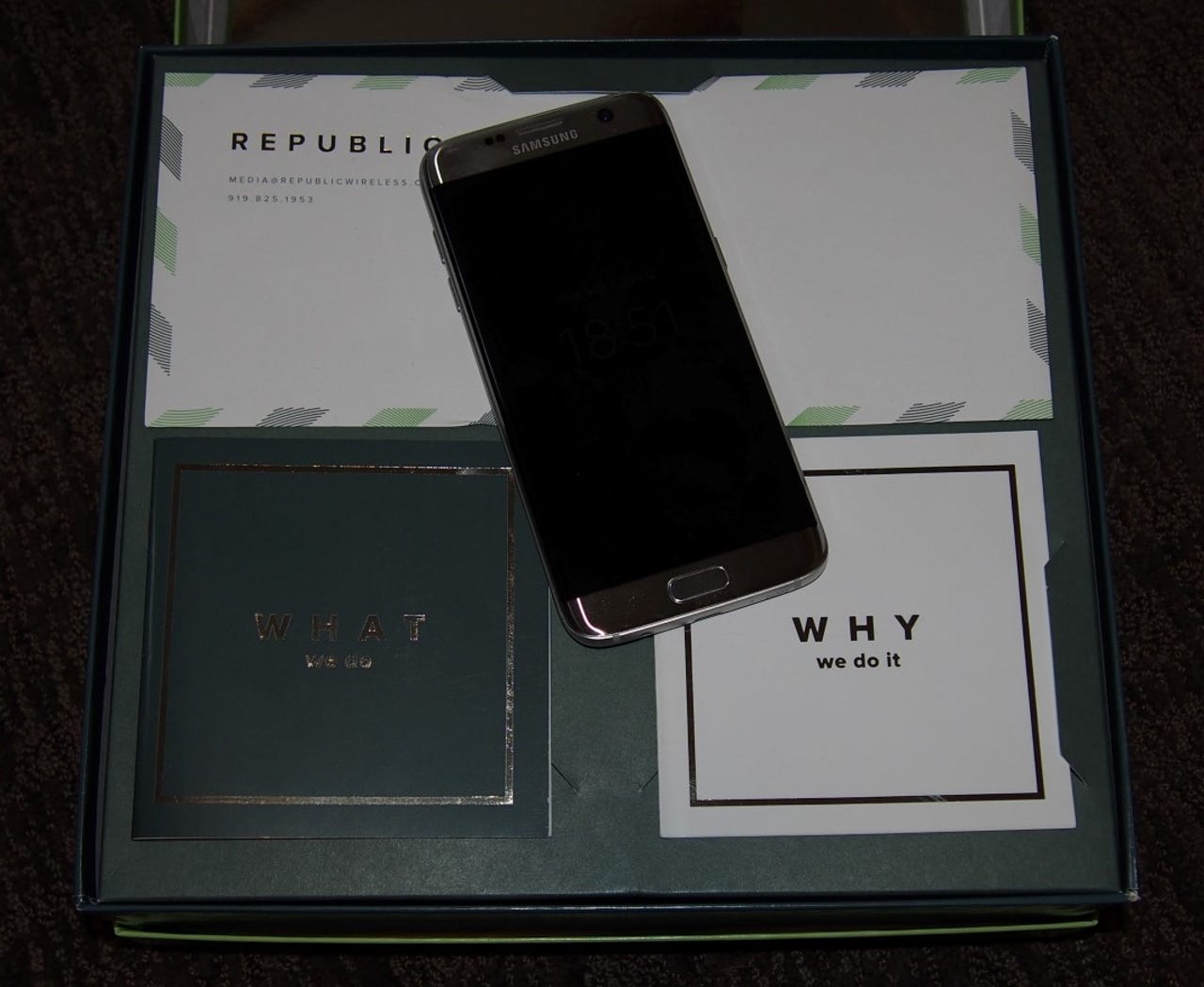Hands-on with a Samsung Galaxy S7 Edge on Republic Wireless: A better Wi-Fi calling experience


If you spend most of your day in an office, coffee shop, home, or other facility covered with a Wi-Fi network, then you should be able to use that network for high-quality phone calls. Republic Wireless focuses on using Wi-Fi networks to your advantage and does it so much better than the US carriers offering Wi-Fi calling.
I first covered Republic Wireless in 2013 and have seen it add new phones and a network to its unique Wi-Fi-focused service plans. For a couple years, you were limited to a select few Motorola phones and updates were few and far between. That recently changed for the better.
In May, Republic Wireless announced that it added a US GSM carrier and would be offering modern Android smartphones to its customers. The new partnership is with T-Mobile and consumers can now choose from four Samsung Galaxy phones, a Moto X, and last year's two Nexus devices to use with Republic Wireless. You can also bring your own compatible phone to Republic Wireless and later take this phone to another GSM carrier.
Republic Wireless has focused on connecting users first to Wi-Fi, with Sprint serving as the backup cellular network. When I first heard of the GSM carrier addition, I believed that Republic Wireless would function as Project Fi does, with Sprint, T-Mobile, and US Cellular backing up Wi-Fi connections.
It turns out that's not the case, and these new modern Android smartphone offerings are limited just to the T-Mobile network. Republic Wireless still focuses on a Wi-Fi experience, but with these phones, you do not get the Sprint network support if Wi-Fi drops out. Republic is working to get CDMA support on future phones, and those with current CDMA Sprint-compatible phones will continue to receive service as before.
Republic Wireless service on a Samsung Galaxy S7 Edge: in pictures
In regard to multiple cellular network options, Project Fi beats out Republic Wireless. However, Project Fi doesn't prioritize Wi-Fi like Republic Wireless does and instead finds the network that Google feels is best at the time. To make sure that Wi-Fi is being used on Project Fi, you have to go into airplane mode and toggle on Wi-Fi. This is really more trouble than its worth, and if you want a true Wi-Fi calling experience, then go with Republic Wireless. Project Fi is also limited to three Nexus phones.
Republic Wireless excels at Wi-Fi calling, while US carriers seem to offer it as an after thought to check a box in a service list. I've been a T-Mobile customer for nearly 15 years and used to buy phones from T-Mobile to make sure it had Wi-Fi Calling support. I don't know why I worried about this, though, as I was regularly disappointed in the performance of calls over Wi-Fi, and it's now one of the first things I turn off in the new phone setup process.
Republic uses Bonded Calling to fill in gaps in Wi-Fi with cellular data so that calls are not lost as you transition in and out of Wi-Fi range. In my testing, this works extremely well, and if I wasn't actively checking the phone, I would never have known what network the phone call was being made through. There is a small Republic Wireless logo that appears in the upper status bar to confirm your network connection.
Samsung Galaxy S7 Edge review product and screenshot gallery
There is an interesting article on Republic's Bonded Calling that demonstrates it has gone far beyond the basic Wi-Fi calling provided by cellular carriers. None of the carriers provide the high-quality seamless handoff that Republic does as you switch between cellular and Wi-Fi and then back again.
In addition to phone calls, Republic Wireless supports text messaging through Wi-Fi networks. I've often had issues with text messaging when I had T-Mobile Wi-Fi calling enabled, which is another reason I toggle it off right away. Text messaging via Wi-Fi on the S7 Edge and Republic Wireless was a flawless experience.
It's great to see a fantastic device like the Galaxy S7 Edge now available for Republic Wireless customers. Here's a list of all the phones you can now purchase through Republic Wireless or bring to the network yourself through a SIM-only option.
- Samsung Galaxy S7 Edge - $799 (or as low as $48 a month*)
- Samsung Galaxy S7 - $699 (or as low as $42 a month*)
- Samsung Galaxy J3 - $179 (or as low as $11 a month*)
- Samsung Galaxy S6 - $549 (or as low as $33 a month*)
- Nexus 6P by Huawei - $499 (or as low as $30 a month*)
- Nexus 5X by LG - $349 (or as low as $21 a month*)
- Moto X Pure Edition - $349 (or as low as $21 a month*)
- Moto G4 - $199 (or as low as $12 a month*)
- Moto G4 Plus - $299 (or as low as $18 a month*)
The plan offerings for Republic Wireless can be as low as $15 per month for unlimited talk, text, and Wi-Fi data up to $90 for 10GB of cellular data. If you spend the majority of your time in areas covered by Wi-Fi, you can likely get by with the 1GB ($20) or 2GB ($30) monthly plan and save a ton of money over traditional carrier plans.
There are no contracts with these plans, and each month you can switch around to fit your needs and usage patterns. You will no longer see a credit for unused cellular data, but the plans have dropped in price. There are also no overage charges, and if you find you need more data during a month, you can upgrade by paying the difference for the next tier level.
Since I also have a Google Nexus 6P on hand, I popped the Republic Wireless SIM out of the S7 Edge and into the 6P for more testing. There is an Android app available that you need to install to activate your unlocked phone. The app also lets you view all of your account details and switch your plans right from your phone. The Nexus 6P performed flawlessly with the Republic Wireless SIM.